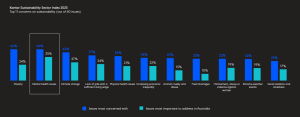
Mental health, poverty and climate change top the sustainability issues that Australians are most concerned with and want addressed in 2023
Kantar’s 2023 Sustainability Sector Index reveals Australia’s sustainable behaviours by sector, the impact of the cost-of-living crisis and why brands must show leadership to inspire behaviour change
- 7 in 10 say that things better for society and/or the environment are more expensive
- 6 in 10 expect to personally feel climate change effects in their lifetime and want real action
- Half are prepared to invest time and money to support companies that try to do good
- Just 22% of the three-quarters who want to live a sustainable lifestyle are actively doing so
Sydney, 15 November 2023: The cost-of-living crisis is biting hard on Australia’s mental health, which is the sustainability issue that Australians most want addressed for the second year in a row according to the newly released Kantar Sustainability Sector Index 2023. Seven in 10 Australians cite cost as being prohibitive to actioning real sustainable behaviour change, saying that things better for the society and/or environment are more expensive.

Social issues dominate as nine of the top 11 (out of 40) concerns, which is unsurprising says Kantar Australia Head of Qualitative Carolyn Reid, given Kantar Australia’s 2023 Finding Financial Freedom report also reveals that 92 per cent of Australians are actively making significant budgetary changes to their lives this year. “Given what we know about the current cost-of-living crisis, sustainability leadership in supporting Australia’s financial wellbeing must be addressed by businesses and brands.
“Australia is a highly individualistic culture, which influences our sustainability concerns and behaviours. Our worries are rooted in what impacts us directly, now. To inspire action, brands must find a way to connect with people on their big issues and make them relatable. In doing so, brands must ensure that they’re speaking to Australians in a way that resonates, and with the sort of humorous and optimistic tone that feels natural and focused on the main issues that they care about. Brands that get this right will reach the 49 per cent who are prepared to invest time and money to support companies that try to do good. This rises to three in five Millennials (59 per cent) biding well for the future.”
Environmental concerns also continue to worry Australians and they want brands to show leadership here
Climate change also continues to rank highly as both an issue of concern and one that people want addressed as 60 per cent of Australians say they expect to personally feel climate change effects in their lifetime and want real action. They believe it is a responsibility of companies and brands to help solve or tackle climate change and environmental issues (49 per cent), but just 27 per cent think that those companies and brands are taking significant actions to help mitigate these issues domestically.
“Sustainability isn’t an option for brands anymore but delivers a business imperative and a commercial opportunity,” say Kantar Australia Sustainability Leads Madeleine Andrews and Mathilde Pernot.
“Getting this right is crucial. Those brands in the Kantar BrandZ 2022 Top 100 Most Valuable Global Brands that rated highly on the Kantar Sustainability BrandZ Index grew their brand value by 31 per cent in 2022 (compared to 23 per cent for all Top 100 Global Brands). However, many people feel let down when it comes to sustainability. Acting with bravery and boldness to lead the way in sustainability is a critical imperative for any sector.”
“Part of the challenge for businesses is in converting a macro corporate ESG strategy into a brand strategy that connects with consumers. This is not easy. Brands need a nuanced understanding of the opportunities to cut through and drive meaningful change. By focusing on shared value creation – what benefits your brand, people and the planet – you can futureproof your business.”
Australians really want to live a sustainable lifestyle, but many people are struggling to do so
Over three-quarters (76 per cent) want to live a sustainable lifestyle but only 22 per cent are doing because they struggle to translate their values into action. Almost half (46 per cent) believe that buying ‘sustainable’ shows others who they are and what they believe in (rising to 61 per cent of Gen Z) and over two in five (43 per cent) have stopped buying certain products/services because of their impact (rising to 49 per cent Gen Z).
Yet, six in 10 say it is hard to tell which products are good or bad ethically or for the environment (61 per cent) and over one-third don’t know where to find sustainable or ethical products (36 per cent). Plus, they want to be told ‘why’. 58 per cent want clear certification explaining the environmental or ethical benefits that would influence their purchase. Closing the Value-Action Gap is one of the biggest challenges that both consumers and businesses are facing today, adds Carolyn Reid, “but there is a real opportunity for brands to lead the way.”
“Understanding how Australians perceive your sector and its role in sustainability will enable you to address it in a relevant way. And when brands get this right, it works. To better understand how brands can intervene, the Kantar Sustainability Sector Index identifies the Value-Action Gap for 42 sectors and reveals that some are ripe for radical change and leadership.”
“A new consumption culture is emerging, and brands must think or re-think how they create value and innovate. Successful brands make people feel empowered to make truly better choices. Brands can enable behaviour change by using the Sustainability Sector Index to identify levers that will prevent or enable change to both design and execute for success.”
“To close the Value-Action Gap, brands must address the fuels and frictions that influence people’s decision-making,” says Reid.
“It is imperative to prioritise both the social and environmental issues impacting your brands, products or services – and the lives of the people you seek to meaningfully connect with. It ensures the insights, territories or innovations that you address are ownable and distinctive to your brand, while understanding your brand’s sustainability table stakes. Further, it provides actionable guidelines on how to express your ambitions and actions in the most authentic, impactful, and differentiated way.”
The 2023 Kantar Sustainability Sector report is now available to purchase as an Australian, global, APAC or other country-specific report. Find out more at https://kantaraustralia.com/sustainability-hub/.
-ends-
For interviews or more detail including on any of the 42 sectors covered in the 2023 Sustainability Sector Index, please email jeannie.duhigg@kantar.com.
About Kantar
Kantar is the world’s leading marketing data and analytics business and an indispensable brand partner to the world’s top companies, including 96 of the world’s 100 biggest advertisers. We combine the most meaningful attitudinal and behavioural data with deep expertise and technology platforms to track how people think and act. We help clients develop the marketing strategies that shape their future and deliver sustainable growth. www.kantaraustralia.com
About the Sustainability Sector Index
With data insights taken from 32,000 interviews across 42 sectors in 33 countries, Kantar’s Sustainability Sector Index 2023 is a landmark study that empowers marketers to build the foundations of their brand’s sustainability strategy and activation plan in a consumer-relevant way. It identifies what really matters to consumers, how they behave and how they currently perceive a sector. The Index is shaped to show where and how brands can credibly play and enables marketers to unlock engagement, reap commercial rewards and connect strategy with the UN’s Sustainable Development Goals.


